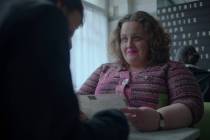A class act: Collins strives to find good balance of past, present, future
Judy Collins has “always been more than a folk singer,” as she reminds an interviewer calling to discuss the 54-year career that brings her to The Smith Center’s Reynolds Hall Sunday night.
During those decades, Collins has sung everything from “Amazing Grace” to the Beatles’ “In My Life” to Stephen Sondheim’s rueful “Send in the Clowns,” which won a Grammy Award as Song of the Year after Collins’ recording turned the Broadway ballad into a Top 20 pop hit.
But there was one person who didn’t want Collins to be a singer at all.
That would be Collins’ childhood piano teacher, Antonia Brico — the subject of the Oscar-nominated 1974 documentary Collins produced, “Antonia: A Portrait of the Woman.”
When Collins opted to become a singer rather than a concert pianist, Brico “was terribly upset,” Collins says, “which was not surprising.”
After all, “I was her child prodigy,” says Collins, who made her public concert debut at 13, performing a Mozart concerto. “This was a natural feeling, for her to be furious.”
But Collins’ decision to pick up a guitar and unleash her crystalline voice “was not a matter of choice,” the singer acknowledges. “I had to do this. I had to take this all the way.”
That choice has taken her quite a long way, with 50 albums to her credit — and 120 live shows a year — since her first gigs in 1959, when a folk-music boom made stars of Collins and contemporaries such as Bob Dylan, Joan Baez and Peter, Paul and Mary.
And when Collins, who’s 74, wasn’t singing or recording during those decades, she was writing books — eight of them, including her memoirs “Trust Your Heart” and “Sweet Judy Blue Eyes: My Life in Music.” (The latter title, of course, refers to Crosby, Still &Nash’s hit “Suite: Judy Blue Eyes,” which ex-boyfriend Stephen Stills wrote about Collins.) She’s at work on her ninth book.
Through the years, Collins also has found time for political activism. (Lest we forget, Collins testified at the 1969 Chicago Seven trial and responded to a question from defense attorney William Kunstler by singing “Where Have All the Flowers Gone?” from the witness stand — that is, until Judge Julius Hoffman stopped her, saying, “we are not here to be entertained.”)
More recently, Collins has made several TV specials — the latest, devoted to the songs of Ireland and filmed in the Emerald Isle’s County Clare, will air on PBS early next year. (To say nothing of other TV credits, including “Girls,” where she asked “Where you going, sweetheart?” from the stage as protagonist Hannah, played by writer-creator Lena Dunham, departed in the grip of obsessive-compulsive disorder.)
Collins plans to perform a new song from her Ireland TV special, “In Twilight,” during Sunday’s Smith Center concert.
She also expects to revisit such longtime favorites as “Since You’ve Asked,” “Albatross” and “My Father.”
Collins wrote those songs, but her repertoire include numerous works by songwriters who have since become legends themselves, from Joni Mitchell (“Both Sides Now,” “Chelsea Morning”) and Leonard Cohen (“Suzanne,” “Bird on a Wire”) to Randy Newman (“I Think It’s Gonna Rain Today”).
Just don’t expect to hear all of them — or any of them, because Collins doesn’t have a standard set list.
After 54 years on the concert trail, “I have so many things to choose from,” she acknowledges.
Just ask her audiences at New York’s famed Cafe Carlyle, who know “every night is different,” Collins says. “I do whatever I want to do, wherever I am.”
It’s an eclectic approach that Collins traces back to her childhood.
“I always had so much music in my life,” she reflects, from “my father’s Irish repertoire” to Broadway stalwarts Rodgers and Hart.
But back to Collins’ father, a radio host.
“His adventurousness in musical choices was part of my musical education,” she says.
Clearly, she learned that lesson well. To borrow the title of one of Collins’ songs, she was “Born to the Breed.”
At the start of her career, Collins realized, “you’re going to have to work your ass off.”
And now, more than 50 years later, she’s learned something else: “You have to spend more time working your ass off.”
That includes looking after her voice, which another friend and folk singer, the late Richard Farina, once described with the words “If amethysts could sing … ”
Unlike many of her contemporaries, whose voices have changed (and not for the better) through the years, Collins’ voice maintains its ethereal purity.
“The short story is, I had a great teacher,” with whom she studied for 32 years.
The longer answer: “I was raised in a professional family. I understood why people had problems.”
And when Collins had problems (which required surgery in 1977), she was “totally lucky” to recover and retain her distinctive singing voice.
“The overarching problem is amplified sound,” she explained. “Amplified sound makes people do things to their voices that damage them.” And dealing with “the stress of the stage” prompts some singers to “strain the voice and pay the price.”
Through the years, “I think my choice of material has been helpful — I’m not banging and straining my throat,” Collins says, adding “I use the phrasing and the clarity of the lyrics.”
Her classical musical training also has helped — and so has the fact that “I now don’t drink anymore,” she acknowledges.
Ultimately, “it’s a game of roulette, especially when you’re a singer,” she adds. “You’re so vulnerable to the fate of your health.”
And, of course, to the inevitable passage of time.
“There’s a lot to be said for the congruence of time, tempo and feeling,” Collins says.
Looking back is something Collins does frequently, in part “because I write books,” she says. But “you mustn’t stare into the past.”
Overall, she reflects, “have a good balance of past, present and future” — something she attributes, in part, to that choice she made long ago to devote her life to “what I was born to do.”
In her view, “people need to be entertained and moved — they need the healing that comes with live music,” Collins says. “And what a great thing it is to have an audience.”
Contact reporter Carol Cling at ccling@reviewjournal.com or 702-383-0272.
PREVIEW
WHO: Judy Collins
WHEN: 7:30 p.m. Sunday
WHERE: Reynolds Hall, Smith Center for the Performing Arts, 361 Symphony Park Ave.
TICKETS: $37-$99 (702-749-2000, www.thesmithcenter.com)




























